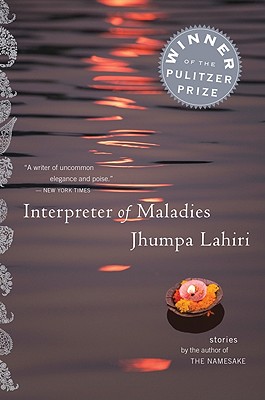 If my memory serves me right, I believe I discovered this novel from a literary blogsite that I found really interesting and creative. The author reviewed the book really well and it got me intrigued, so were the multiple reviews that I read as well in goodreads.com and amazon.com. I saw the copy at fullybooked and got even more excited when I realized it won a Pulitzer Prize. When I got home, I planned on making an organize list of books that I need to read in the next few months, so after reading the synopsis of the novel I really found it compelling. Needless to say, I expected very much from the novel. Sadly, it became a very huge disappointment for me, so disappointing that I actually want to either sell the book or just give it away as a gift to a friend. I keep regretting how I could have actually bought a different book in replace for this one. Don’t get me wrong, Jhumpa Lahiri’s Interpreter of Dreams is still worth a read, only it doesn’t really deserve the high praise that it has been receiving.
If my memory serves me right, I believe I discovered this novel from a literary blogsite that I found really interesting and creative. The author reviewed the book really well and it got me intrigued, so were the multiple reviews that I read as well in goodreads.com and amazon.com. I saw the copy at fullybooked and got even more excited when I realized it won a Pulitzer Prize. When I got home, I planned on making an organize list of books that I need to read in the next few months, so after reading the synopsis of the novel I really found it compelling. Needless to say, I expected very much from the novel. Sadly, it became a very huge disappointment for me, so disappointing that I actually want to either sell the book or just give it away as a gift to a friend. I keep regretting how I could have actually bought a different book in replace for this one. Don’t get me wrong, Jhumpa Lahiri’s Interpreter of Dreams is still worth a read, only it doesn’t really deserve the high praise that it has been receiving.The book is divided into 9 short stories, and most of them tell the tale of a Indian immigrant’s life and reflection living in the United States. For me, such plot coming from one who actually bears that kind of lifestyle isn’t very challenging. Lahiri may have just compiled small reflections of her own experiences without using much creativity. Also, most of the plot wasn’t really going anywhere and just when you hope that something self-fulfilling is about to strike you within, the story suddenly ends in a very forceful manner.
COMMENTS
Plot: Uninteresting plot really. Most great writers in fact don’t need to provide a good plot as long as the different writing elements are there, but Lahiri’s style is just far off from the greats. I am actually convinced that she has the writing style of an amateur. Like I said above, most of the stories compiled in the book belongs to an immigrant and their own perspective in an alien culture, or a recurring experience in their own land which is now very odd and different from their own disposition. It doesn’t really tell much, when a certain sequence tries to be intimate, it becomes too corny that you can tell the storyline is forced to be that way or is thought too hard that it doesn’t become too credible.
Characters: Forgettable and, in its deepest sense, annoying. I think Lahiri’s style is to blame here. Even when she tries to take the voice of a child or a sad old man, or even a middle aged sentimentalist, the way she tones their voices are either unconvincing or too forced. It’s hard for me to believe such characters exist or think the way she made them think, and even if they do, Lahiri didn’t form and exposed them in a way to allow the reader to like them.
Imagery: Lahiri writes too “telling” it becomes boring in that sense. To make an example, instead of describing the smell of a homemade pie by revealing the expressive faces of the children circling the treat, she just gives the ingredients of the pie. Very hard not to resist turning and skipping the pages whenever she tries to be descriptive.
Reflections: There were reflections that were fine and subtle for a normal reader but I think I have high standards for this one. As a positive note though, I think Lahiri is moderate and average when it comes to letting her characters reflect. But it does need a lot of work in order to hold her the stories she writes together.
Writings Style: Unimpressive and very amateur like. Although some readers may actually favour her style, it’s definitely not my taste. She uses too many adjectives and she bundles up too many descriptive words to describe a certain object, view, or event which isn’t even that all interesting or relevant to the plot. I don’t see the point. It would have been fine if there was an objective for the waste of words she used but I never really found one even if I tried.
No comments:
Post a Comment